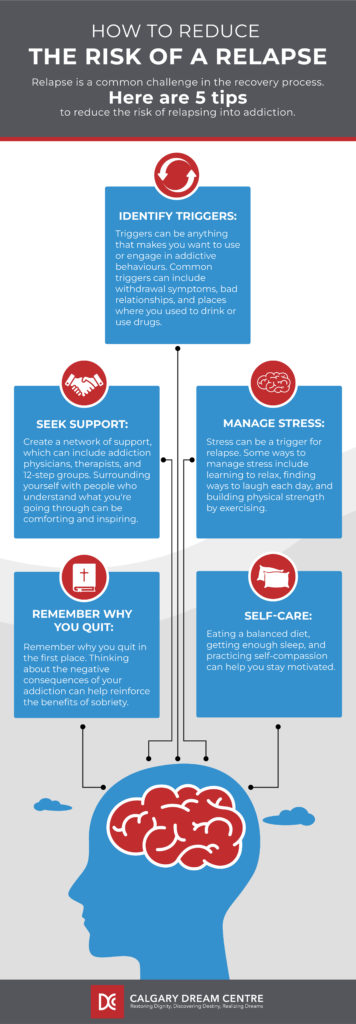Recovering from substance use disorder is a journey that requires dedication, commitment, and perseverance.
But even after completing a recovery program, the risk of relapse can remain high. Many individuals recovering from substance use disorder often face relapse challenges during the first 90 days of sobriety.
Therefore, a relapse prevention plan is integral for people in recovery. Identifying triggers, seeking support, managing stress, and focusing on self-care are key parts of a relapse prevention plan that can help maintain sobriety and lower the risk of a relapse.
What Is a Relapse?
Relapse is the recurrence of substance use after a period of abstinence. It can occur at any point in recovery, regardless of whether someone has been in recovery for a few weeks or several years.
The relapse process typically begins long before the actual act of using drugs or alcohol. It starts with triggers, which can be anything from a stressful situation to feelings of anxiety or depression.
It’s important to recognize that relapse is not a failure. It’s a common and difficult aspect of the recovery process.

How Can You Reduce the Risk of a Relapse?
It is important to have a relapse prevention plan in place to reduce the risk of a relapse. The strategies and habits we recommend include the following:
Identify & Understand Triggers
Identifying and recognizing relapse triggers is crucial for maintaining recovery.
Relapse triggers can be anything that makes you want to use or engage in addictive behaviours. Common triggers include:
- Withdrawal symptoms
- Challenging relationships
- People who enable you
- Drug supplies and other objects that remind you of previous substance use habits
- Places where you used to drink or engage in other forms of substance use
- Loneliness
- Stress
- Poor self-care
Once you’ve identified your triggers, you can create a plan for dealing with them in the moment. This plan can include calling or meeting with a sponsor or close friend.
Seek Support & Treatment
Recovering from addiction is not a journey you have to do alone. It can be essential to create a network of support, which can include addiction physicians, therapists, and support groups.
Surrounding yourself with people who understand what you’re going through can be a tremendous source of comfort and inspiration. Additionally, reconnecting with family and friends can help you build a social network and reconnect with the world around you.
Manage Stress
Stress can be a significant trigger for relapse. Creating a plan to recognize and deal with your feelings and day-to-day stressors can help you stay on track.
Some ways to manage stress include learning strategies to relax, finding ways to laugh each day, and building physical strength by exercising. Practicing mindfulness or meditation can also help you stay grounded and focused.
Remember Why You Quit
When you’re dealing with challenges in recovery, it can be helpful to remember why you quit in the first place. Thinking about the negative consequences of your addiction can help reinforce the benefits of sobriety.
Remembering that cravings are normal and a part of the recovery process is also essential. When you experience cravings, try distracting yourself with a healthy activity or reaching out to your support network.
Focus on Self-Care
Taking care of yourself is crucial for maintaining recovery. It can help to eat a healthy, balanced diet, get enough sleep, and take steps to manage stress. Additionally, practicing self-compassion can help you stay motivated and positive.
Recovery is a journey, and it’s normal to have setbacks. Developing a plan to overcome challenges as they appear and continue making progress on your journey can help you reach your goals for healthy, wholesome life experiences.
The Signs of a Relapse
Understanding the signs of a relapse can also help your loved one through recovery. There are 3 stages of relapse, including emotional, mental, and physical relapse.
Emotional Relapse
At the beginning of the emotional relapse stage, you might not even be aware that you’re experiencing a relapse. This is because emotional relapse isn’t characterized by cravings or the desire to use substances.
Instead, it’s marked by a decline in self-care practices and support network engagement. You may stop attending meetings, neglect exercise or healthy eating, or avoid therapy sessions at this stage.
Mental Relapse
In the mental relapse stage, you may notice persistent thoughts of using drugs or alcohol again. You might start romanticizing past use, thinking about the good times without considering the harm and damage it caused you or others.
Another sign of mental relapse is bargaining with yourself–making mental deals and holding on to thoughts like “just one drink won’t hurt.” This bargaining can lead to psychological turmoil as you grapple with the desire to use again while attempting to stay sober.
Physical Relapse
The final stage of relapse is when you follow through with the urge to use drugs or alcohol again. Physical relapse can happen gradually, with occasional use that slowly becomes more frequent and leads back to more significant substance use challenges.
On the other hand, it can also happen abruptly, with a single instance leading to an immediate return to addiction.
Your Dedicated Recovery Program
Recovering from substance use disorder is not always an easy journey, but it is possible with a strong support system, dedication, and a well-thought-out relapse prevention plan.
Remember, recovery is about progress, not perfection, and setbacks are a normal part of the process. If you or a loved one needs support in creating a relapse prevention plan or resources for recovery, contact Calgary Dream Centre. We offer addiction recovery programs and community housing programs to help you throughout your recovery journey.



